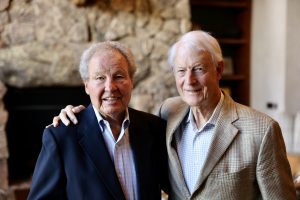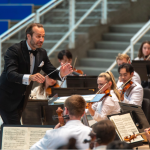Renee Fleming’s directorial twist looks like a hit at the Wheeler

Diego Redel/Courtesy photo
On the elevator up to theater level at the Wheeler Opera House Monday, a gray-haired woman opined, “I hear this is weird.” She was not available for comment after the music festival’s staging of Mozart’s “Così fan tutte,” but judging by the audience’s enthusiastic response, Renée Fleming hit a bullseye.
The capsule elevator review upon descending got a big thumbs-up from a different group. Setting the action in 1980 coastal Massachusetts instead of the original’s bayside Naples, Italy, actually made the emotional details — and there are plenty of them in the second act — resonate better with a modern audience.
Performances continue Wednesday and Saturday.
The opera contains some of Mozart’s finest music for both voice and orchestra, even if the storyline revolves around a bet between two young men and their older, more experienced friend who maintains that women cannot remain faithful. Of course, the boys’ girlfriends have their own, more mature, woman friend, who insists it’s the men who are unfaithful.
Neither is exactly right, of course, but this staging makes it clear that the women get the short end of the cruel trick the boys play on them. Fleming engineers an ending (without changing a word of the libretto or a note of the music) in which they get what they want and the men don’t.
Although the title translates to, roughly, “all women are like that,” in several pre-opening interviews Fleming pointed out the subtitle: “The School for Lovers.” The staging emphasizes that aspect, that we all have a lot to learn about love and lust, which makes for a sort of coming-of-age story. She chose 1980 because it precedes the internet and social media, so the high school-age boyfriends and girlfriends are still trying to figure it all out.
The year 1980 also coincides with a fitness craze (think Jane Fonda, the movie “Rocky,” and the dawn of modern pro wrestling). The action centers on a gym, and gives the girls some agency by making them as physically active as the boys.
Glittery costumes associated with pro wrestling go a long way to improve the disguises for the boys as each woos the other girl. It gets closer to believable than anything I’ve seen in dozens of other productions. The get-ups for the “doctor” and the “notary” were also well crafted.
In this setting, Alfonso (a world-weary philosopher in the original) is an ex-boxer who owns the gym and drinks excessively. Despina (the girls’ maid) is the gym manager selling fitness drinks to make extra money. Ferrando is portrayed here as nerdy and Guglielmo as athletic, lusting after the girls, but clueless. The sisters Fiordiligi and Dorabella are different in their own ways, but everyone in the cast reflects the intentions of the original characters nicely.
Much of the action is timed nicely with the music. Fleming’s direction finds details in the action to respond to the music, often with a tellingly timed gesture or change of expression. And there’s some fun to be hand whenever Mozart’s music gets bouncy and the girls (and non-singing friends in fitness wear) break into rhythmic exercises.
The genius of all this is in the critical Act II scenes where wooing the other guy’s girlfriends (and watching his girlfriend be tempted) brings up disturbing feelings. Each responds differently. Fleming’s ending has the young women carve out their own way rather than settle for the usual choice of who ends up with whom (a point that the original libretto sidesteps). The young women take over the gym, Dorabella takes up with the hunk Alfonso, Fiordiligi dons a “ERA Now” sweatshirt, Despina departs for a better life in Boston, and the boys are deservedly cut adrift.
As for the music, Patrick Summers (Fleming’s co-director of the voice program in Aspen) brought together a lively, sensitively balanced, and insightful performance from the orchestra and singers. Vocally, all the singers delivered the familiar arias well, and sounded great together in the many duets and ensembles.
Standouts were soprano Laura Miah as Despina, whose participation anchored so many of the duets and ensembles, and mezzo-soprano Ashlyn Brown as Dorabella, especially in her Act II aria “È amore un ladroncello.” Baritone Finn Sagal as Guglielmo, particularly in his duet scenes with mezzo-soprano. Tenor Jonghyun Park found the beauty in his aria “Un’aura amorosa” when he fails (at first) to win over Fiordiligi, and thinks he’s winning the bet.
For her part, soprano Lauren Carroll had the heavy lifting in the aria department with her Act I aria “Come scoglio” and an even better Act II aria “Per pietà, ben mio, perdona.” As Alfonso, Peter Barber’s solid bass-baritone never flagged, and he looked the part of retired boxer.
Harvey Steiman has been writing about the Aspen Music Festival for more than 30 years He regular reviews appear in The Aspen Times Tuesdays and Saturdays.









